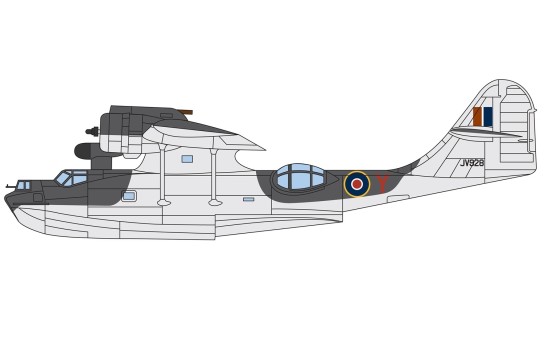You have no items in your shopping cart.
RAF Consolidated Catalina JV928 J. A. Cruickshank 100 years CG36111 1:72
RAF Consolidated Catalina Mk.IVA JV928 John Alexander Cruickshank 100 years collection Corgi CG36111 scale 1:72
Highly detailed Corgi Aviation diecast model airplane
Highly detailed Corgi Aviation diecast model airplane
Details
RAF Consolidated Catalina Mk.IVA JV928 John Alexander Cruickshank 100 years collection Corgi CG36111 scale 1:72
Highly detailed Corgi Aviation diecast model airplane
Consolidated Catalina IVA JV928 ‘Y’, F/Off John Alexander Cruickshank VC, RAF No.210 Squadron, Sullom Voe, Shetland Islands, 17th July 1944 – the sinking of U-361.
Aircraft: Consolidated PBY5 Catalina
Item#: AA36111, 36111, CG36111
Scale: 1:72
As an Island nation, Britain would rely heavily on the contribution of long ranging maritime patrol aircraft during WWII, particularly the flying boats and brave crews of Coastal Command. Working alongside the mighty Short Sunderland, the American built Consolidated Catalina proved to be one of the most successful aircraft of its type, able to mount patrols which sometimes exceeded eighteen hours in duration and more than capable of destroying any enemy shipping they encountered along the way. During one such patrol on 17th July 1944, Catalina JV928, piloted by Scotsman John Cruickshank, was five hours into a mission west of the Lofoten Islands in the Norwegian Sea, when the crew obtained a radar signal from the sea below. Aware that the Royal Navy were reportedly in the area, the aircraft flew down for a closer look, only to be confronted by German U-boat U361 and its compliment of anti-aircraft guns. Immediately preparing to go on the offensive, Cruickshank executed a perfect attack run, only to see the depth charges to fail to release from the aircraft. Determined to press home their attack and with the weapon issue now resolved, the Catalina was brought in for a second run, this time into a hail of well aimed shells from the U-boat crew now fully aware of the aircrafts destructive intentions. Taking multiple hits to the front of the Catalina and inflicting significant injuries on crew members, the attack resulted in the depth charges deploying at exactly the right moment, straddling the U-boat and causing its destruction. John Cruickshank had suffered 72 wounds during the frenetic attack, but despite the pain and loss of blood, refused morphine so he could remain alert to help his inexperienced co-pilot land the aircraft following the five hour return flight. For his part in this action, John Cruickshank was awarded the Victoria Cross.
Although the Battle of Britain is regarded by most people to be the RAF’s most decisive victory of WWII, the constant struggle to protect Britain’s vital sea lanes against German U-boats and surface raiders proved arguably more decisive. It is difficult to imagine the mental and physical strain placed on the crews of Coastal Command aircraft, who were forced to endure arduous patrols, often lasting many hours and having to constantly scan vast expanses of ocean for even the smallest sign of enemy activity. Should a target present itself, they would potentially have to launch an effective attack at short notice, aware that the enemy would be frantically attempting to disappear below the waves or were preparing to defend themselves with every gun at their disposal. Add to this the knowledge that they were still many miles and several hours flying time from the safety of their home base and completely exposed should the engagement leave them with damage to their aircraft, or injuries to crew members and you understand why these men are viewed with such admiration to this day. As if to underline the perilous nature of these missions, four brave Coastal Command airmen were awarded Britain’s highest award for gallantry in the presence of the enemy, the Victoria Cross during the Second World War, but only one survived to receive the honour in person – Flying Officer John Alexander Cruickshank, Royal Air Force Volunteer Reserve, RAF No.210 Squadron.
Additional Info
-
Stock#CG36111
-
BrandCorgi Aviation
-
Country of Manufacture
-
Scale1:72
-
MaterialDie-cast Metal
-
Aircraft TypeFixed-Winged
-
EraWorld War II
-
AircraftPBY Catalina
-
PropulsionPropeller-Driven
-
RoleSurveillance
-
CountryGreat Britain
Warning: Choking Hazard!
Contains small parts. Not a toy. Not for children under 3 years.

